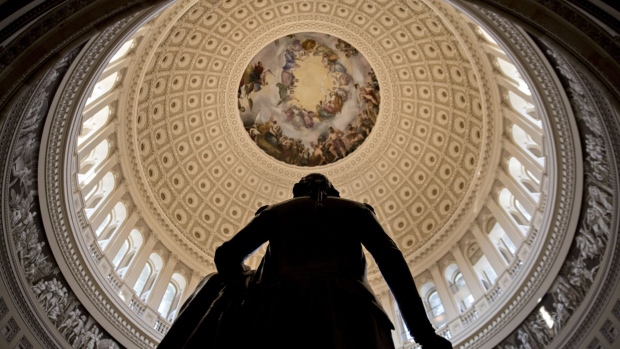Apr 19, 2023
House Moderates Float US Debt-Limit Extension Until December
, Bloomberg News

(Bloomberg) -- A bipartisan group of moderate House lawmakers on Wednesday proposed a backup plan to set aside the US debt limit through year-end, in case President Joe Biden and House Speaker Kevin McCarthy fail to reach a deal on a longer-term solution in the coming weeks.
By suspending the debt limit until Dec. 31, “this will afford us time” to complete the 2024 annual federal appropriations bills and pull together a longer-term deficit-stabilization program, the House Problem Solvers Caucus said in their release.
The proposal reflects growing concern among members of the 64-person group that a US payment default could come as soon as June, amid little sign of an end to the partisan faceoff over the debt limit.
There would be an “automatic conversion” from a Dec. 31 deadline to a Feb 28, 2025 deadline, if Congress enacts several fiscal reforms later this year, according to the plan:
- The creation of a special bipartisan commission that would formulate deficit-reducing measures by December 2024. That plan would then get an up-or-down vote in the next Congress, by the end of February 2025.
- The establishment of as-yet-undefined budget controls in the coming annual appropriations process.
- Several budget-process changes would be instituted, including enforcement of annual budget deadlines, a new annual report from the independent Comptroller General on deficits, and a requirement for the president to submit a mid-year budget update.
“We can both suspend the debt ceiling and help prevent our nation’s economy from driving off a fiscal cliff — and address our nation’s longer-term fiscal health,” Josh Gottheimer, a New Jersey Democrat who co-chairs the Problem Solvers, said in a statement.
The group says the new commission would be able to propose revenue increases as well as spending cuts. A similar commission was created in 2010 to come up with a deficit plan, but it failed to muster the votes to force Congress to take up the proposal as a bill.
“The debt ceiling and debt crisis demand a two-party solution,” said Brian Fitzpatrick, the Pennsylvania Republican who also serves as co-chair to the group.
There is virtually no chance the proposal could be enacted by June without McCarthy’s consent. An arcane discharge petition process to force a House floor vote would likely take months to utilize.
This week, McCarthy is working to corral votes for his own debt-ceiling plan, which would increase the limit for roughly a year in exchange for deep spending cuts and regulations changes that are non-starters with congressional Democrats and the White House. If Republicans can pass that plan through the House next week, McCarthy hopes Biden will then sit down for talks over a compromise plan.
Read More: Biden Slams McCarthy Wall Street Debt Speech as Risking Default
Analysts at Goldman Sachs Group Inc. on Tuesday warned that, due to declining tax receipts, the date for a US default could be closer to June — rather than August, as some economists have predicted. The Treasury Department is expected soon to offer an update on the timeline for when it will exhaust special measures to keep within the current, $31.4 trillion debt ceiling.
Read More: Goldman Sees Anemic Tax Revenue Raising Odds of June Debt Limit
(Updates with co-chairs’ statements, in first and third paragraphs after bullet-pointed section.)
©2023 Bloomberg L.P.






